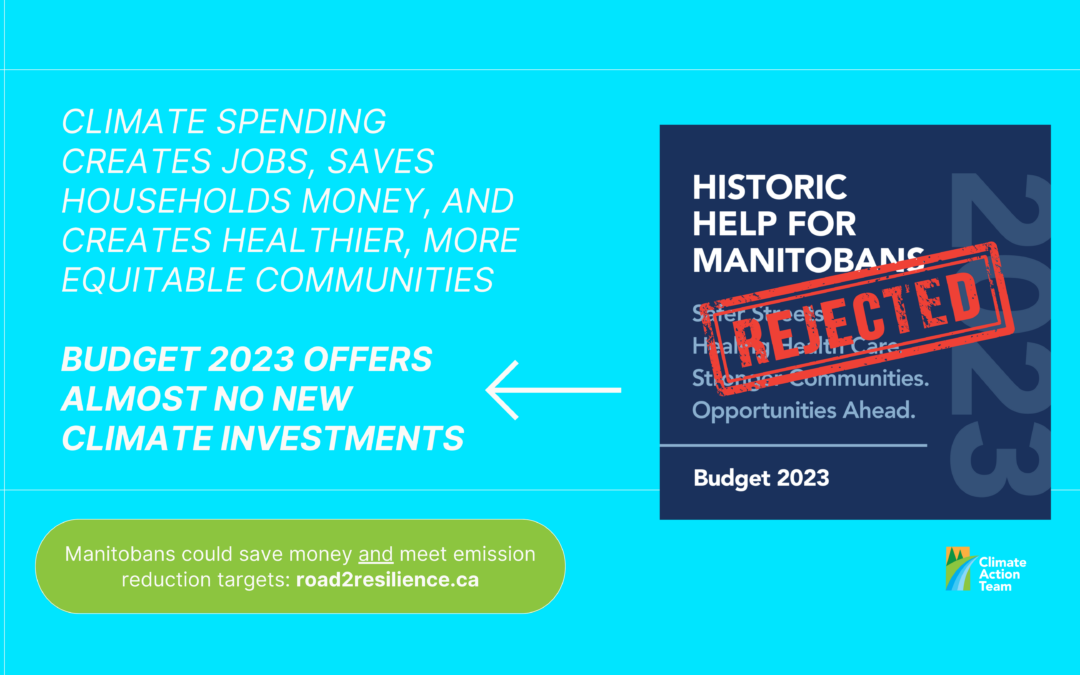Climate scientists have tasked policymakers with reducing greenhouse gas (GHG) emissions to net-zero by 2050. By 2030, the federal government has pledged to reduce national emissions by 40% to 45% below 2005 levels. With only seven years left until that first deadline, Manitoba is not only not approaching that goal, our emissions remain consistently above 2005 levels. Out of all the provinces, only Alberta can also claim this dubious distinction. Despite our clean electricity grid, 70% of our province’s energy still comes from fossil fuels, generating 21.7 megatonnes of carbon dioxide equivalent in 2020.
Manitoba needs to be moving towards net-zero emissions—not only through dedicated targets and policy commitments but also through adequate funding to transition our economy to 100% renewable energy. Unfortunately, the provincial government has neither a 2030 or 2050 climate target, and its spending commitments are similarly lacking.
What follows is a (not necessarily exhaustive) summary of climate and environment spending in the 2023 budget:
- $170,000 for Climate West, a non-profit climate data and services organisation that serves Manitoba, Saskatchewan and Alberta
- $8.7-million to support recycling, composting and waste diversion initiatives across the province through the Waste Reduction and Recycling Support program
- $550-million (which includes contributions from the federal government and City of Winnipeg) for the second phase of upgrades to the Winnipeg North End Water Pollution Control Centre.
- $10-million to support the new parks capital plan and operating requirements
- $1.6-million for implementation of the Water Management Strategy
- $13.4-million for transit system operations in the municipalities of Winnipeg, Brandon, Selkirk, Flin Flon, and Thompson
- “New green investments” for the Efficient Trucking Program, including contributions from the federal government
Most of the expenditures announced by the provincial government under the category of climate and environment deal largely with environmental management, leaving little by the way of energy transition.
The biggest sources of greenhouse gas emissions in Manitoba are the transportation and building sectors. If we are to meaningfully reduce emissions in these areas in line with scientific targets, we need policies and programs that will help Manitobans transition to cleaner and more efficient energy alternatives, while not placing the financial onus on those who cannot afford it. Key areas are dramatically expanding both municipal and inter-community public transportation, providing financial support for electric vehicle purchases as well as creating an extensive, well maintained public charging infrastructure network, increasing energy efficiency of homes and buildings, and converting all natural gas homes and buildings to geothermal.
In our submission to the public consultation on the provincial budget, Climate Action Team (CAT) presented the following recommendations. Our submission is based on the Road to Resilience, a series of evidence-based technical, policy, and economic reports that detail for the first time how Manitoba can reduce its GHG emissions in line with climate science timelines, while also creating positive financial and employment outcomes for its citizens, businesses, and government.
Our proposal is for the province to create its own Manitoba carbon pricing scheme. With our own provincial scheme, all carbon pricing revenue could be directed to climate action programs in the sector it came from. Directing the majority of carbon pricing revenue towards climate action programs will go further towards reducing emissions compared to returning it in the form of a rebate (as under the current federal system), and these programs will save more Manitobans more money over the long-term. We do recommend keeping a carbon pricing rebate in place for people with low to moderate incomes (the bottom 40%), recognizing that that is financially necessary for some.
CAT recommendations:
- $170,000 for Climate West, a non-profit climate data and services organisation that serves Manitoba, Saskatchewan and Alberta
- $8.7-million to support recycling, composting and waste diversion initiatives across the province through the Waste Reduction and Recycling Support program
- $550-million (which includes contributions from the federal government and City of Winnipeg) for the second phase of upgrades to the Winnipeg North End Water Pollution Control Centre.
- $10-million to support the new parks capital plan and operating requirements
- $1.6-million for implementation of the Water Management Strategy
- $13.4-million for transit system operations in the municipalities of Winnipeg, Brandon, Selkirk, Flin Flon, and Thompson
- “New green investments” for the Efficient Trucking Program, including contributions from the federal government
Carbon pricing regime
- Assign carbon pricing to all GHG emissions, including those from agriculture, landfills and industrial processes.
- Use carbon pricing revenue to finance the energy efficiency and electric vehicle zero-interest loans programs described above, while keeping rebates in place for low and moderate income households.
Non-budgetary recommendation: government leadership on climate
- Establish and fund a new climate unit at the most senior level of the provincial government.
